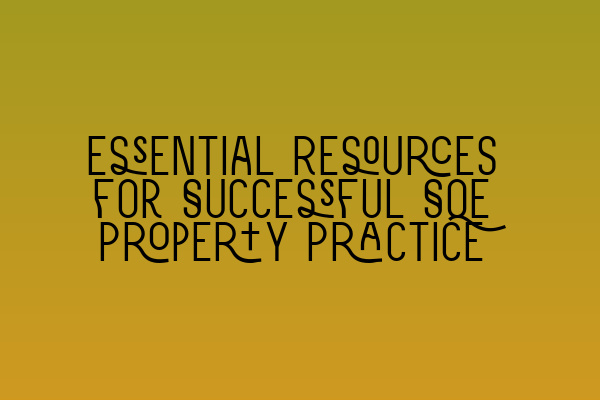Essential Resources for Successful SQE Property Practice
Welcome to the SQE Property Law & Land Law blog, where we provide expert insights and guidance to help you excel in your legal career. As a solicitor, it is essential to have the right resources at hand to ensure a successful SQE Property practice. In this article, we will explore some of the key resources that every aspiring property lawyer should have in their arsenal. Whether you are a seasoned professional or just starting your journey, these resources are invaluable for staying up-to-date, honing your skills, and achieving success in the field of property law.
1. Relevant Legislation and Case Law
It goes without saying that a solid understanding of property law requires a thorough knowledge of the relevant legislation and case law. Property law is a constantly evolving field, and staying abreast of the latest updates is crucial. The Land Registration Act 2002, the Landlord and Tenant Act 1987, and the Housing Act 2004 are just a few examples of legislation that property lawyers need to be familiar with. Additionally, regularly reviewing and analyzing case law decisions is essential for understanding how the law is interpreted and applied in practice.
To deepen your understanding of the subject matter, we recommend reading our related article on Understanding Contractual Capacity: Rights and Limitations. This article explores the concept of contractual capacity, which is often relevant in property transactions.
2. Comprehensive Practice Guides
In addition to legislation and case law, having access to comprehensive practice guides is crucial for a successful SQE Property practice. These guides provide practical advice, tips, and checklists that can save you time and help you navigate complex property transactions with confidence. Look for resources that cover various aspects of property law, including conveyancing, leases, easements, and more. One example is the Law Society’s Conveyancing Handbook, which offers step-by-step guidance on residential and commercial conveyancing transactions.
3. Online Research Databases
Online research databases are a treasure trove of legal information and resources. Platforms like Westlaw, LexisNexis, and Practical Law provide access to a wide range of case law, legislation, commentary, and specialist journals. These databases offer sophisticated search functionalities, making it quick and easy to find relevant materials for your research. Utilizing online research databases not only saves you time but also ensures that you have access to the most up-to-date and authoritative information.
If you’re looking for interactive mock tests to test your knowledge of contract law, we invite you to check out our related article on Interactive SQE Mock Tests for Contract Law: Test Your Knowledge. These tests can help you assess your understanding of key contract law principles.
4. Professional Networks and Associations
Building a strong professional network is essential for success in any legal practice area, including property law. Joining relevant associations and participating in networking events can help you establish connections with other professionals in the field, exchange knowledge and insights, and stay updated on industry trends. The Law Society’s Property Section and the Conveyancing Association are just a couple of examples of associations that offer valuable networking opportunities and resources for property lawyers.
To gain expert insights and guidance from our webinars, make sure to visit our related article on Join Our SQE Contract Law Webinars: Expert Insights and Guidance. These webinars cover various topics related to contract law and can provide valuable information for property practitioners as well.
5. Continuing Professional Development (CPD) Courses
Continuing Professional Development (CPD) courses are essential for maintaining and enhancing your skills as a property lawyer. These courses offer opportunities to deepen your knowledge, stay updated on changes in the law, and develop your expertise in specific areas of property law. Many providers offer online CPD courses specifically tailored for property lawyers, covering areas such as property litigation, commercial leases, and land registration.
Conclusion
In conclusion, successful SQE Property practice requires access to essential resources that help you stay informed, make informed decisions, and deliver excellent service to your clients. By staying up-to-date with relevant legislation and case law, utilizing comprehensive practice guides and online research databases, building a strong professional network, and investing in ongoing professional development, you can ensure that you have the tools you need to excel in your property law career.
For a deeper understanding of the concept of contractual capacity in property transactions, we recommend reading our related article on Contractual Capacity: Understanding Legal Competence in Contracting Parties. Additionally, if you are interested in understanding the recent reforms in contract law, take a look at our analysis in the article Contract Law Reforms: An Analysis of Recent Changes.
